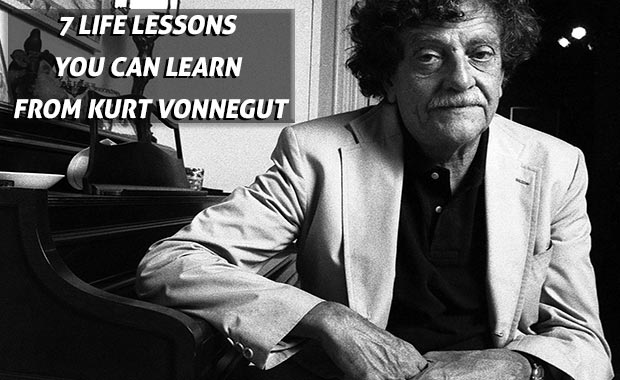Life
7 Life Lessons You Can Learn From Kurt Vonnegut

Writer Kurt Vonnegut was an American literary icon who was beloved as much for his attitudes about life as for his unique style of writing.
Born in 1922, he was marked in his early life by his experiences in WWII and dedicated much of his career to exposing the tragedies of war, particularly in works like his masterpiece Slaughterhouse Five and his last book A Man Without a Country. Vonnegut’s words and life serve as models for kindness, creativity and humor.
Here are 7 life lessons you can learn from him:
1. Don’t be lazy
In the beginning of his writing career, Vonnegut took in 3 of his sister’s children after both she and her husband died. He now had six children to care for. While working full-time as an advertising executive, Vonnegut also managed to write and publish five novels over the following decade. Though overburdened and overworked, he still managed to dedicate himself to his life’s passion: writing.
Always carve out time for the things that are important to you. Whether it’s waking up at 4am to write every morning before going to work or taking time during lunch breaks to work on a personal project, find the time in the corners of your life for the things you feel passionate about. That’s the only way they’ll find their way to center stage someday.
2. Be kind
Vonnegut’s experiences as a soldier in WWII left a deep impression on him. In order to make sense of such tragedy, Vonnegut concluded that kindness is the only thing that can redeem humanity. In his novel God Bless You, Mr. Rosewater, he wrote, “There’s only one rule that I know of, babies – God damn it, you’ve got to be kind.”
Fire can’t put out fire and hatred can’t dispel hatred. The only way to win a battle against injustice and hatred is love and kindness.
When you’re faced with a situation that invites you to respond with anger, remember that this will only perpetuate the problem. Compassion and love are gifts you can offer not only to the other person, but to yourself in those moments.
3. Don’t forget to laugh
Vonnegut was a champion of humor and not taking life too seriously. Taking life too seriously never got anyone anywhere. But laughing and sharing laughter can give you exactly the right distance you need from your troubles.
The next time you find yourself feeling overburdened, make a conscious effort to lighten up. Watch a comedy, call a friend who makes you laugh, play with your children or your pet, or just go out for a night of dancing. Whatever makes you smile.
“Laughter and tears are both responses to frustration and exhaustion. I myself prefer to laugh, since there’s less cleaning up to do afterward.” – Kurt Vonnegut
4. Don’t be afraid to be different
One of the things that made his writing outstanding was the non-traditional way he wrote. Long sentences, exuberant use of exclamation points and italics, the mixing of genres made his books extraordinary and a style all his own. He wouldn’t have become the icon he became if he’d done what everyone else did.
Maybe you’re afraid what people will think if you dress a certain way, play a certain kind of music or express an unpopular political opinion. Have the courage to say, wear, think and be who you are. Many of the most celebrated writers, painters, scientists and thinkers were those who ran against popular opinion. Don’t let fear squelch your brilliance – let it shine.

5. Take care of the environment
Vonnegut was also a champion of environmental causes: “I really wonder what gives us the right to wreck this poor planet of ours.” The planet has its limits, so getting behind those who are trying to live in harmony with those limits is a worthwhile cause.
Seek out information either from local environmental enthusiasts or the Web. Look at your lifestyle and see how you can contribute to making sure your passage through this planet is less harmful. These changes don’t have to be huge. There are a myriad of small things you can do to minimize your impact. By becoming conscious you also help spread consciousness to others.
6. Don’t get caught up in dogma
Vonnegut was a critic of organized religion. To him, the purpose of human life was a continuous mystery and not necessarily one that should or could be solved.
Whether you follow a religion or not, it’s important to keep an open mind about the possibilities of our existence. This allows for acceptance of others, and fosters healthy curiosity and peaceful coexistence.
Instead of preaching to others about your religion, try something different. Try to find out more about other people’s faith. The more knowledge and information you have about other types of religions, the more tolerant you will be. If more people practiced this, there might be less conflict in the world.
“She was a fool, and so am I, and so is anyone who thinks he sees what God is doing” – Kurt Vonnegut
7. Express yourself
In his last novel A Man Without a Country, he urged people to find a means of creative expression: “…go into the arts…They are a very human way of making life more bearable. Practicing an art, no matter how well or badly, is a way to make your soul grow, for heaven’s sake. Sing in the shower. Dance to the radio. Tell stories. Write a poem to a friend, even a lousy poem. Do it as well as you possible can. You will get an enormous reward. You will have created something.”
Creative expression is a gift and one that’s uniquely human. The arts are a means of self-understanding.
Find a way to express yourself. Everyone has something inside of them to share. Try out different ways of expression until you find yours. You won’t regret it.
Enjoy these life lessons from a great writer and humanitarian!
Did You Know
How Skilled Migrants Are Building Successful Careers After Moving Countries
Behind every successful skilled migrant career is a mix of resilience, strategy, and navigating systems built for locals.

Moving to a new country for work is exciting, but it can also be unnerving. Skilled migrants leave behind familiar systems, networks, and support to pursue better job opportunities and a better future for their families. (more…)
Life
10 Research-Backed Steps to Create Real Change This New Year
This New Year could finally be the one where you break old patterns and create real, lasting change.

Every New Year, we make plans and set goals, but often repeat old patterns. (more…)
Life
9 Harsh Truths Every Young Man Must Face to Succeed in the Modern World
Before chasing success, every young man needs to face these 9 brutal realities shaping masculinity in the modern world.

Many young men today quietly battle depression, loneliness, and a sense of confusion about who they’re meant to be.
Some blame the lack of deep friendships or romantic relationships. Others feel lost in a digital world that often labels traditional masculinity as “toxic.”
But the truth is this: becoming a man in the modern age takes more than just surviving. It takes resilience, direction, and a willingness to grow even when no one’s watching.
Success doesn’t arrive by accident or luck. It’s built on discipline, sacrifice, and consistency.
Here are 9 harsh truths every young man should know if he wants to thrive, not just survive, in the digital age.
1. Never Use Your Illness as an Excuse
As Dr. Jordan B. Peterson often says, successful people don’t complain; they act.
Your illness, hardship, or struggle shouldn’t define your limits; it should define your motivation. Rest when you must, but always get back up and keep building your dreams. Motivation doesn’t appear magically. It comes after you take action.
Here are five key lessons I’ve learned from Dr. Peterson:
-
Learn to write clearly; clarity of thought makes you dangerous.
-
Read quality literature in your free time.
-
Nurture a strong relationship with your family.
-
Share your ideas publicly; your voice matters.
-
Become a “monster”, powerful, but disciplined enough to control it.
The best leaders and thinkers are grounded. They welcome criticism, adapt quickly, and keep moving forward no matter what.
2. You Can’t Please Everyone And That’s Okay
You don’t need a crowd of people to feel fulfilled. You need a few friends who genuinely accept you for who you are.
If your circle doesn’t bring out your best, it’s okay to walk away. Solitude can be a powerful teacher. It gives you space to understand what you truly want from life. Remember, successful men aren’t people-pleasers; they’re purpose-driven.
3. You Can Control the Process, Not the Outcome
Especially in creative work, writing, business, or content creation, you control effort, not results.
You might publish two articles a day, but you can’t dictate which one will go viral. Focus on mastery, not metrics. Many great writers toiled for years in obscurity before anyone noticed them. Rejection, criticism, and indifference are all part of the path.
The best creators focus on storytelling, not applause.
4. Rejection Is Never Personal
Rejection doesn’t mean you’re unworthy. It simply means your offer, idea, or timing didn’t align.
Every successful person has faced rejection repeatedly. What separates them is persistence and perspective. They see rejection as feedback, not failure. The faster you learn that truth, the faster you’ll grow.
5. Women Value Comfort and Security
Understanding women requires maturity and empathy.
Through books, lectures, and personal growth, I’ve learned that most women desire a man who is grounded, intelligent, confident, emotionally stable, and consistent. Some want humor, others intellect, but nearly all want to feel safe and supported.
Instead of chasing attention, work on self-improvement. Build competence and confidence, and the rest will follow naturally.
6. There’s No Such Thing as Failure, Only Lessons
A powerful lesson from Neuro-Linguistic Programming: failure only exists when you stop trying.
Every mistake brings data. Every setback builds wisdom. The most successful men aren’t fearless. They’ve simply learned to act despite fear.
Be proud of your scars. They’re proof you were brave enough to try.
7. Public Speaking Is an Art Form
Public speaking is one of the most valuable and underrated skills a man can master.
It’s not about perfection; it’s about connection. The best speakers tell stories, inspire confidence, and make people feel seen. They research deeply, speak honestly, and practice relentlessly.
If you can speak well, you can lead, sell, teach, and inspire. Start small, practice at work, in class, or even in front of a mirror, and watch your confidence skyrocket.
8. Teaching Is Leadership in Disguise
Great teachers are not just knowledgeable. They’re brave, compassionate, and disciplined.
Teaching forces you to articulate what you know, and in doing so, you master it at a deeper level. Whether you’re mentoring a peer, leading a team, or sharing insights online, teaching refines your purpose.
Lifelong learners become lifelong leaders.
9. Study Human Nature to Achieve Your Dreams
One of the toughest lessons to accept: most people are self-interested.
That’s not cynicism, it’s human nature. Understanding this helps you navigate relationships, business, and communication more effectively.
Everyone has a darker side, but successful people learn to channel theirs productively into discipline, creativity, and drive.
Psychology isn’t just theory; it’s a toolkit. Learn how people think, act, and decide, and you’ll know how to lead them, influence them, and even understand yourself better.
Final Thoughts
The digital age offers endless opportunities, but only to those who are willing to take responsibility, confront discomfort, and keep improving.
Becoming a man today means embracing the hard truths most avoid.
Because at the end of the day, success isn’t about luck. It’s about who you become when life tests you the most.
Change Your Mindset
The Four Types of Happiness: Which One Are You Living In?
Most people chase success only to find emptiness, this model reveals why true happiness lies somewhere else.

In a world driven by rapid technological growth and constant competition, many people unknowingly trade joy for achievement. (more…)
-

 News2 weeks ago
News2 weeks agoBrandon Willington Builds 7-Figure Business by Ignoring Almost Everything
-

 Health & Fitness2 weeks ago
Health & Fitness2 weeks agoWhat Minimalism Actually Means for Your Wellness Choices
-

 Did You Know2 weeks ago
Did You Know2 weeks agoWhy Most Online Courses Fail and How to Fix Them
-

 Business2 weeks ago
Business2 weeks agoIf Your Business Internet Keeps Letting You Down, Read This
-

 Business5 days ago
Business5 days agoEntrepreneur’s Guide to Pay Stubs: Why Freelancers and Small Business Owners Need a Smart Generator
-

 Business4 days ago
Business4 days agoThe Simple Security Stack Every Online Business Needs
-

 Finances4 days ago
Finances4 days agoWhy Financial Stress Is One of the Biggest Barriers to Personal Growth
-

 Scale Your Business3 days ago
Scale Your Business3 days ago5 Real Ways to Grow Your User Base Fast


























4 Comments